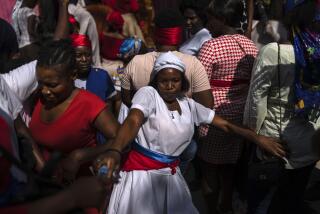Arab Youths in France See Doors Closing on Them
- Share via
VAULX-EN-VELIN, France — Karim, Momo and Rachid stare out at the rain in this low-income housing project near Lyon.
Ages 19 to 23, they are out of school and out of work. Like nearly 40% of their age group, they are just killing time.
There’s no movie theater. The only cafe within walking distance is a stand-up bar on the windowless ground floor of the town hall, a concrete hangar that doubles as a shopping center.
“We’d be happy to show you around, but there’s nothing to show,” Momo says.
When these young men’s Algerian immigrant fathers came to France in the 1960s to work, new housing projects ringing French cities were home to an ethnically mixed population bound by working-class solidarity and pride.
Today, jobs have dried up, and with them a working-class identity. Racism has risen with unemployment, causing white French families to flee the projects and making it harder for dark-skinned residents like North African Arabs to find work.
Boredom, alienation and poverty have in turn bred disregard for social values and the law, pushing up crime.
Suddenly, France faces a phenomenon it once viewed with horror and condescension when pointing to the United States--the ghetto.
“People here, especially young people, live in a climate of thinking there is no hope for them. It’s a world without open doors,” says Pierre Gambet, a retired priest who moved to Vaulx four years ago to work with youths.
He says that regardless of their qualifications, Vaulx’s young men are considered unemployable simply on the basis of their address.
“When they have a job interview, it’s always the same story: The minute the kid says he’s from Vaulx, and his name is Muhammad, he’s shown the door,” Gambet says.
Already in ill repute over rioting by its young, Vaulx-en-Velin hit world headlines last fall as the home of Khaled Kelkal, France’s prime suspect in a bombing wave that has killed eight people and injured 160 since July.
The fingerprints of Kelkal, a 24-year-old native of Algeria, were found on a bomb that failed to explode beside a train track Aug. 26. After a nationwide manhunt, Kelkal was shot to death Sept. 29 when army paratroops closed in on him at a bus stop in a village outside Lyon.
The paratroops said they shot only in self-defense when Kelkal opened fire on them. But the young men outside the Vaulx town hall are unconvinced.
“Do you think they would have shot a French suspect in cold blood?” asks Karim, who also was born in Algeria.
Anger over Kelkal’s death exploded into four nights of rioting in Vaulx and neighboring districts. Youths burned cars, smashed phone booths and stoned police.
Car burnings and violence are not uncommon in the poor, largely immigrant suburbs that ring French cities.
But the violence after Kelkal’s death took on an explosive new dimension, with Kelkal--who allegedly was taking orders from an Islamic extremist group in Algeria--acquiring heroic status among many suburban youths.
Gambet, the retired priest, says he feared the Kelkal affair could push even moderate youths to extremism.
“Most kids here could [not] care less about Islam, or about religion, any more than French kids care about Christianity these days. But when the police track down one of their own and shoot him like a rabbit, everyone identifies with him,” Gambet says.
Momo, Karim and Rachid clam up when asked about religion, but they say they are sick of belonging to a population--young, suburban, Muslim males--that, according to them, gets only negative attention in France.
“Everyone ignores us until a bomb goes off and a couple of thugs burn some cars, and then we take center stage--as the public enemy,” Karim says.
“Do you think we’re monsters?” Rachid asks.
Similar hurt and resentment at being alternately ignored, rejected and reviled by French society emerge starkly in a 1992 interview that Khaled Kelkal gave to a German sociologist. It was published by the Paris newspaper Le Monde after Kelkal was slain.
Kelkal, who described his parents as strict but loving, said he “turned bad” after moving from a multiethnic neighborhood school, where he was at the top of his class, to a French lycee, a high school.
“I had the capacity to succeed, but I couldn’t find my place. At the lycee, there were only rich kids. They had never seen an Arab in their class,” he said.
He started to skip school and hang out with delinquents.
Moving from petty thievery to car theft and robberies, Kelkal landed in jail, where he discovered an identity in the form of Islam.
“I’m neither Arab nor French. I’m Muslim,” he explained.
“When you enter the mosque, you’re at ease right away. There’s no suspicion, no prejudice. You’re brothers even if you don’t know each other.”
That sense of acceptance in what is often perceived as a hostile culture makes Islam a magnet for young suburban Arabs, one that community workers say is exploited by militant Muslims seeking followers.
“Islam is an answer to the problem of self-esteem. It means rediscovering pride, rediscovering origins. And the hard-line recruiters play on this,” says Daniel Bouy, a Vaulx municipal employee.
“Vaulx isn’t a hotbed of radical Islam, but Islam is gaining ground. For these kids, who are already so insecure, the slightest questioning of their ideology feels like an attack on their identity,” he says.
Severine Labat, a political scientist and expert on Algerian Islamic extremism at Paris’ Institute of Political Studies, agrees.
“By designating an entire community as a potential threat, by systematically confusing Arabs, Muslims and terrorists, we are seeing a young minority in France confront this stigma, and then avenge it through Islamic ideology,” she says.
More to Read
Sign up for Essential California
The most important California stories and recommendations in your inbox every morning.
You may occasionally receive promotional content from the Los Angeles Times.













